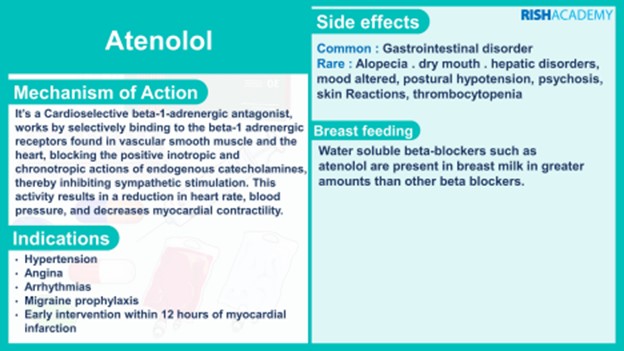A nurse is caring for a client who has gastroesophageal disease and a prescription for metoclopramide. For which of the following adverse effects should the monitor?
Sedation
Hypertension
Urinary retention
Blurred vision
The Correct Answer is A
Metoclopramide is a medication commonly used to treat gastrointestinal disorders such as gastroesophageal reflux disease (GERD). While it is generally well-tolerated, it can have some adverse effects. Sedation is one of the common side effects of metoclopramide. It can cause drowsiness, dizziness, and a feeling of tiredness in some individuals. Therefore, the nurse should monitor the client for any signs of sedation or excessive drowsiness, especially when the client starts taking the medication or when the dose is increased.

Hypertension: Metoclopramide is not known to cause hypertension (high blood pressure) as a common side effect. In fact, it may have a mild hypotensive (blood pressure-lowering) effect in some individuals.
Urinary retention: Metoclopramide does not typically cause urinary retention. Instead, it can enhance gastrointestinal motility and increase the frequency of bowel movements.
Blurred vision: While visual disturbances are rare adverse effects of metoclopramide, blurred vision is not a commonly reported side effect. However, other visual disturbances like oculogyric crisis (involuntary rolling back of the eyes) have been reported in rare cases. Nevertheless, monitoring for blurred vision specifically is not a priority when administering metoclopramide.
Nursing Test Bank
Naxlex Comprehensive Predictor Exams
Related Questions
Correct Answer is B
Explanation
Atenolol is a beta-blocker medication commonly used to treat conditions such as hypertension (high blood pressure) and certain heart rhythm disorders. One of the intended effects of atenolol is to lower the heart rate by blocking the action of adrenaline on beta receptors in the heart. However, this can sometimes result in bradycardia, which refers to a heart rate that is slower than the normal range.

Hypokalemia, or low potassium levels, is not directly caused by atenolol but can be an indirect effect. Beta-blockers like atenolol can potentially interfere with the normal release of insulin and contribute to increased urinary excretion of potassium. Therefore, it's important to monitor potassium levels in clients taking atenolol, as low potassium levels can have adverse effects on various body systems.
Anemia and neutropenia are not typically associated with the use of atenolol. Anemia refers to a decrease in the number of red blood cells or a decrease in the amount of hemoglobin, which carries oxygen to the body tissues. Neutropenia refers to a decrease in the number of neutrophils, which are a type of white blood cell involved in fighting infection.
Correct Answer is C
Explanation
Gastroesophageal reflux disease (GERD) is a condition characterized by the backflow of stomach acid into the esophagus, causing symptoms such as heartburn. Orange juice is highly acidic, and consuming acidic foods and beverages can exacerbate the symptoms of GERD. The acidic nature of orange juice can irritate the esophagus and contribute to increased acid reflux, leading to heartburn.
Sleeping on a large wedge-style pillow can actually help alleviate symptoms of GERD by elevating the head and upper body, reducing the likelihood of acid reflux during sleep.
Eating dinner early in the evening is generally recommended for individuals with GERD as it allows sufficient time for digestion before lying down. This can help prevent acid reflux during sleep.
Consuming low-fat meats is also a favorable choice for individuals with GERD as fatty foods can relax the lower esophageal sphincter, allowing stomach acid to flow back into the esophagus. However, the options provided do not include any fatty foods, so it is not the primary contributing factor to the client's heartburn in this case.
Whether you are a student looking to ace your exams or a practicing nurse seeking to enhance your expertise , our nursing education contents will empower you with the confidence and competence to make a difference in the lives of patients and become a respected leader in the healthcare field.
Visit Naxlex, invest in your future and unlock endless possibilities with our unparalleled nursing education contents today
Report Wrong Answer on the Current Question
Do you disagree with the answer? If yes, what is your expected answer? Explain.
Kindly be descriptive with the issue you are facing.
